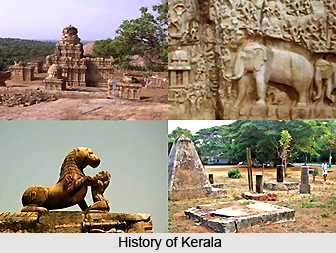
History of Kerala states that this state was the melting pot of many civilisations and cultures and hence contains a rich heritage. A very famous mythological legend is there which speaks of the land's origin - the own country of the God. According to the legend, Parasurama, incarnation of Vishnu, took his position over a lofty cliff and asked the violent sea to move back by throwing his axe in the sea and accordingly the sea responded to the command and the land came out as the sea receded to form Kerala. As per the Archaeologists; the early inhabitants of the state included the food gatherers and hunters of Negrito tribe. After them, came the Austric people. These Austric people were then followed by people who came from the Mediterranean region and called the Dravidians. These Dravidian people moved away to the south but were able to leave a mark of their cultural impact on the Aryans who brought Jainism, Buddhism and Hinduism with them.
Ancient History of Kerala
There is not much known to the historians regarding the ancient history of Kerala since very less is available in written form. Whatever remains is in the form of conjectures and myths and one of the myths is the Legend of Parasurama. The ancient History of Kerala is primarily steeped into myths and legends. According to the geologists, the land of Kerala was elevated from the sea due to a seismic activity, either gradual or sudden.
Besides the legends, the first arrival in Kerala can be identified today only with regard to the burial practices followed by them. Although there are no records, sensible assumption is that those people spoke an archaic form of Tamil and built strange burial monuments of granite. The historians have assumed a time bracket in between the tenth century BC and fifth century AD for these people. It is evident from the grave relics, which includes daggers and iron tridents that these megalithic builders had emerged out of the Stone Age to the Iron Age without moving through the Bronze Age.